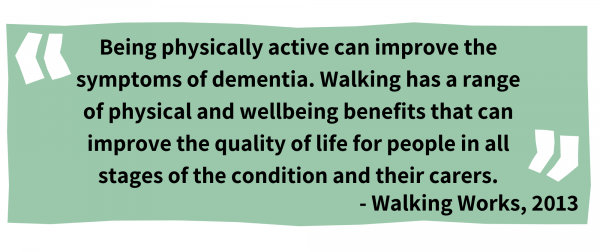Walking and dementia

Walking and dementia
Getting active with dementia

Is it safe to walk with dementia?
Keeping active is recommended by healthcare professionals and walking is one of the safest ways for people living with dementia to get moving. The nature of the condition does mean more consideration needs to be given to things like the route, terrain and proximity to busy roads. And it’s important people with a dementia diagnosis are accompanied on their walks.
Dementia and the benefits of walking
Beyond the physical benefits of getting more active, such as warding off other serious illnesses, and supporting strength and mobility, walking may slow mental decline in people living with dementia, and support memory retention. And walking with a group offers the chance for social interaction, to ward off feelings of isolation and boost wellbeing.
Getting started with walking for people living with dementia
There’s a lot to think about, but the Ramblers Wellbeing Walks can make it easier to get walking safely, and they’re free to join. All our walks are over easy terrain and routes are accessible to all, including people with a dementia diagnosis. And they’re all at a steady pace to suit everyone. Some Wellbeing Walks schemes run walks that are shorter or a slower pace too.
The first steps to being more active, safely
A number of Ramblers Wellbeing Walks schemes run dementia-friendly walks. These walks support the needs of people living with dementia and will:
-
Have more volunteers per walker than other walks, to make sure everyone can walk at their own pace and always be accompanied
-
Often be supported by volunteers with dementia awareness training
-
Start from an easily accessible location
-
Be over flat terrain with accessible footpaths, and always away from busy roads
-
Include a sensory aspect and time for walkers to pause to take in their surroundings
-
Be developed in partnership with local organisations with expertise in supporting people living with dementia, and their carers
Whether a dementia-friendly walk or regular health walk, trained walk leaders are on hand for support. Many people prefer to speak to their local Ramblers Wellbeing Walks co-ordinator before joining to make sure the walk meets their needs, and to discuss any particular requirements.
Dementia-friendly walks
Dementia-friendly walks are run by the following Ramblers Wellbeing Walks schemes:
Find your local Ramblers Wellbeing Walk.
Find out more about dementia and local services
You can find out more about dementia, local services, networks and training by visiting:
Take your first steps to being more active, with confidence
If you are new to walking Ramblers Wellbeing Walks are ideal for getting started with walking and staying active, especially when you’re living with a health condition. Our Ramblers Wellbeing Walks are available in England and Wales.
Support from trained walk leaders helps you take those first steps towards being more active. And you’ll be amongst a friendly bunch all walking for their own reasons - whether to ward off illness, manage health conditions or boost wellbeing.

Walking and epilepsy
Having epilepsy shouldn’t prevent you from going walking. In fact, some people find that when they are active, they are less likely to have seizures.
.jpg?itok=9HneffFG)
Walking and diabetes
Walking helps you take control of your diabetes, safely and effectively. We tell you how, and help you get started, with confidence.
.png?itok=-PDSgCG6)
Walking and heart disease
Got a heart condition? Walking can help manage symptoms, speed recovery and prevent future problems. We tell you how, and help you get started, with confidence.